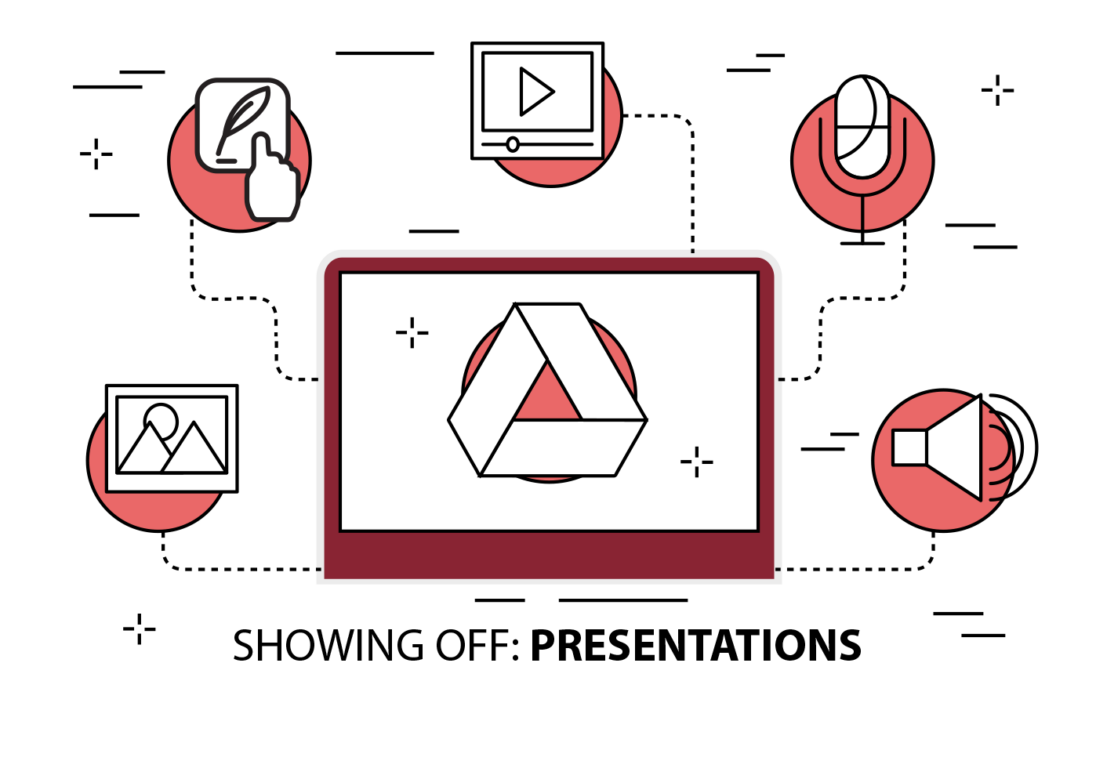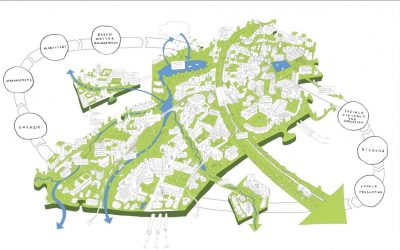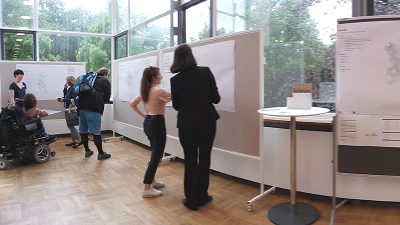All posts in Uncategorized
11 Posts
TSPA in Kocaeli YPP Workshop, ‘Change for Resilience. Resilience for Change’

Ecopolis. Concept for a new city in the Sakhalin region

Density and mixed-use: Innovative approaches to redensification in German and American cities
Innovative, diverse, livable, and sustainable is how we want our cities to grow; this requires a sustainable and resilient redensification strategy. The project «Density & Mixed-Use: Innovative Approaches to Redensification in German and American Cities» aims to support networks between German and U.S. municipalities to explore (new) tools in both countries for building density.
The Project is part of the international exchange network «Dialogues for Urban Change» which aims to strengthen international exchange and promote international learning networks in urban development. The format consists of a total of three networks: between Germany and the USA, South Africa and Ukraine respectively. These networks, each dealing with a different thematic focus, encompass the city and national levels as well as city associations and aim to improve urban development approaches in the participating countries.
Recommendations for sustainable urbanization in Africa — Thomas Stellmach in the Bundestag
“In my opinion, it is not expedient to try to stop urbanization in Africa. On the contrary, the focus should be on intervening in a steering manner to make it as sustainable as possible.”
– Thomas Stellmach at the German Bundestag in late December, where he gave recommendations in the Committee on Economic Cooperation and Development regarding sustainable urbanisation.

TSPA kommt zurück nach Russland. Strogino River Embampment Design Wettbewerb
Мы прошли во второй этап Открытого международного онлайн-архитектурного конкурса по освоению правобережья Москвы-реки от МКАД до Строгинского шоссе, инициированного Комитетом по архитектуре города Москвы.
Вместе с WOWHAUS ЦТП входит в единственный международный консорциум, который вместе с двумя другими российскими коалициями будет участвовать в следующем этапе конкурса. Мы с нетерпением ждем возвращения в Россию, где в прошлом мы разрабатывали действительно интересные проекты.
Мы хотим, чтобы это предложение отражало нашу цель — создать «Устойчивую окружающую среду и жилые кварталы» с фирменным подходом, который характеризует нашу работу, думая системно и ставя на первое место природу. Поскольку Строгино является таким уникальным фрагментом города — частью природно-исторического парка «Москворецкий», важным элементом природно-экологического каркаса Москвы.
Для нас большая честь участвовать в этом конкурсе с офисами City Makers, Orchestra Design, Arteza, Zoloto Group, Masters Plan, Apex, Abitant,8 Lines, Regional Consulting.
Work platforms: Remote Presentations, Data Collection and Analysis
This is the third publication of the series “From work desks to work platforms” in which we share the strategies and tools that have helped us doing remote-work even before the Coronavirus Pandemic. Here we present two out of nine tools, remote presentations, data collection and data analysis.
3. Showing Off: Presentations
Presentations on Site and Remotely: Slides / Powerpoint / Keynote

What we needed
As opposed to the previous chapter, that dealt with internal presentation, here we talk about external presentations — be it to a client or a lecture at a conference. We searched for a tool that lets develop presentations quickly, intuitively and work simultaneously with external collaborators. Another essential demands are easily grant access editing rights and offline working mode.
What we picked, and why

Work Platforms: Tools for Local and Remote File Sharing, Co-creating Documents and Discussing Ideas
This is the second publication of the series “From work desks to work platforms” in which we share the strategies and tools that we have used doing remote-work even before the Coronavirus Pandemic. Here we present two of the nine tools we use. In the next posts we will share more.
III. The Tools
1. Enabling Team Work: Local and Remote File Sharing
File Sync, File Sharing, File Versioning: Dropbox

From Work Desks to Work Platforms
This is the first publication of a series in which we will share the strategies and tools that have worked for us in our experience with remote working. The next publications will which tools we use and how we use them.
How to work remotely without dropping the pencil.
Authors: Aleksandra Katasonova, Filippo Imberti, Thomas Stellmach
Graphics: Amr Elsayed
This document describes the remote work tool kit we use at TSPA. It is specifically the tools that work best for us (you’ll find some links to broader collections of solutions at the end of the text).


Berlin’s largest extension site: TSPA & B+B selected for Blankenburger Süden process
TSPA together with B+B has been selected as one of the teams that will form part of the cooperative workshop process in the development of Blankenburger Süden, Berlin largest urban expansion site. Starting in autumn 2019 and continuing until spring 2020, four teams will develop as many different test designs as possible for the planned new city district. The resulting ideas and images will be used to develop a new structural and utilisation concept (so-called «Alternative D») for the south of Blankenburg.
Our team is happy to be part of a cooperative workshop process in which teams create the test designs simultaneously. The workshop process is the third building block of the so-called laboratory phase. The first two building blocks of the laboratory phase are «Sharpening key objectives» and «Clarifying framework settings».
The area to which the sketches will be tested is of around 150 hectares. It extends from the former location of the Fachhochschule für Technik und Wirtschaft (FHTW) in the north to the approx. 90 ha core area — formerly a Rieselfeld, today arable land — to the Heinersdorf industrial estate in the south. In addition, the test designs will focus on the connection to the neighbouring neighbourhoods.
Some of the topics we will be discussing critically and creatively are: uses and functions, urban planning, open spaces and ecology, mobility and transport, and interdependencies with the neighbourhoods.
We are very happy to exchange ideas in this workshop with our salted collegues:
YelowZ
bgmr Landschaftsarchitekten
UmbauStadt
MLA+
Fugmann Janotta und Partner
CITYFOERSTER
Felixx Landscape
Context
The south of Blankenburger Süden development is a response to the housing shortage in the state of Berlin located in what is still considered «a phantom» of green grounds and one of Pankow’s most rural regions. The 90 hectare core area projects to accommodate 5,000 to 6,000 apartments.
«Four teams of planners with a focus on urban development and landscape architecture will take part in the cooperative, urban planning workshop procedure. These four teams were selected via an EU-wide award procedure» explains Katrin Dietl, spokeswoman for the Senate Department for Urban Development (Schubert, 2019;Berliner Morgenpost).
In response to the housing shortage in the state of Berlin, the last legislative period prompted the search for suitable locations for housing construction throughout the entire Berlin city area. In spring 2016, the choice fell not only on ten further locations but also on the state-owned properties in the south of Blankenburg.
When the test drafts are available in spring 2020 — they should be as varied as possible and deliver concrete ideas and pictures — a draft can be derived from them which the Berlin House of Representatives will finally vote on.
Read more:
Senatsverwaltung für Stadtentwicklung und Wohne, «Blankenburger Süden Aktuelle Entwicklung» (2019)
Schubert, Thomas. «Ein „Klimawald“ für den Blankenburger Süden» ( 23.08.2019)

Sophie Leemans, architecture intern at TSPA was awarded with the Jef Van Ranst Prize
 Our our dear colleague and architecture intern, Sophie Leemans was awarded with the Jef Van Ranst Price 2019 for the free-hand design sketches that form part of her master thesis master thesis “Adaptive architecture and flood permitting cities”. The award ceremony took place during the Flemish Architecture Festival as part of the symposium “Drawing Attention” on 25th September in Ghent.
Our our dear colleague and architecture intern, Sophie Leemans was awarded with the Jef Van Ranst Price 2019 for the free-hand design sketches that form part of her master thesis master thesis “Adaptive architecture and flood permitting cities”. The award ceremony took place during the Flemish Architecture Festival as part of the symposium “Drawing Attention” on 25th September in Ghent.

Public Toilet Infrastructure in Berlin — Zebralog Interview
Read the interview with Britta Letz (German) about the project cooperation between TSPA and Zebralog for the new structural concept for public toilets in Berlin:
Im August 2017 hat der Berliner Senat das von Regine Günther (Senatorin für Umwelt, Verkehr und Klimaschutz) vorgelegte Toilettenkonzept beschlossen. Es wurde von TSPA in Zusammenarbeit mit Zebralog und der TU Berlin erarbeitet. Bis März 2018 läuft nun die europaweite Ausschreibung für die Beschaffung, Errichtung und Betrieb der Toilettenanlagen. Wie der Beteiligungsprozess dazu lief und warum der Dialog unser Projektteam so begeisterte, ist im Interview mit Zebra Britta Letz zu lesen.
Liebe Britta, laut eigener Aussage gehört der sogenannte Berliner „Toilettendialog“ zu einem deiner Lieblingsprojekte bei Zebralog — wieso?
Zunächst weil das Thema sehr konkret ist und es wirklich alle betrifft. Jede*r „muss mal“. Eine öffentliche Toilette ist für die Teilhabe vieler Menschen am öffentlichen Leben wesentlich. Vielleicht ist es auf den ersten Blick kein Thema, wozu man sich als „Durchschnittsmensch“ viele Gedanken macht. Aber eine barrierefreie und gut zugängliche Toilette ist beispielsweise für viele Menschen mit Behinderungen eine Grundvoraussetzung, um sich in der Stadt frei bewegen zu können.[…]
Das Thema „Öffentliche Toiletten“ hat so viele Facetten, wenn man sich damit befasst, wie eine Toilette ausgestattet oder an welchem Ort diese aufgestellt werden sollte. Inklusion ist hier das Stichwort. Und damit sind nicht nur Menschen mit Behinderungen gemeint. Für Menschen mit unterschiedlichen Behinderungen muss die Toilette natürlich barrierefrei sein. Darüberhinaus fühlen sich womöglich Frauen bei schlecht einsehbaren Toiletten mit geringer Außenbeleuchtung unsicherer als andere. Ältere Personen brauche eine einfache Handhabung zur Verriegelung mit wenig Schnickschnack. Dann stellt sich auch die Frage nach einer diskriminierungsfreien Toilette für alle Geschlechter – und: 50 Cent oder kostenfrei für Alle?Nicht zuletzt sei natürlich erwähnt, dass die Zusammenarbeit mit unserem Projektpartner Thomas Stellmach Planning und Architecture (TSPA) eine wirklich harmonische und beteiligungseuphorische Zeit war. Wir waren ein geladenes Projektteam aus Fachexpertise und Beteiligungserfahrung!
Read the full text here (German).


 English
English Deutsch
Deutsch